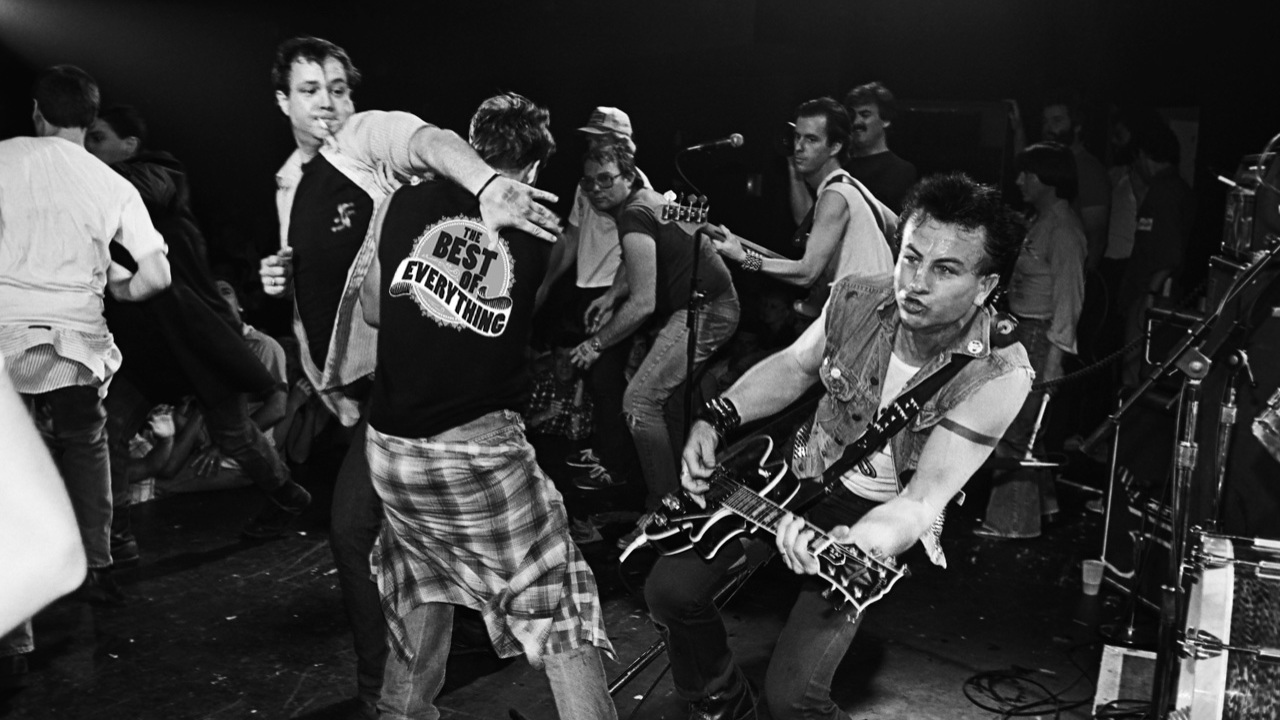Since its first instalment was released in 1981, Penelope Spheeris’ Decline Of Western Civilization trilogy has become a cult institution. Mapping the various rock’n’roll sub cultures that dominated LA’s backstreets during the 1980s and 90s, Spheeris infiltrates them all, from the testosterone-filled youths who would go on to shape the sound of west coast hardcore, to Sunset Strip’s hapless hard rockers, and eventually the tragic teenagers who make up the late 90s gutter punk contingent. While it’s been increasingly hard to get hold of the films over the years, they’re finally being rereleased as a four-disc box set on August 31st. To celebrate, we bring you its 10 defining tracks.
X – Nausea Though they would become art-punk trailblazers in the years following Decline, X were yet to record Los Angeles, their now classic debut album, when the film was shot. Despite this, the mid-paced dirge of Nausea kicks off the trilogy, as the camera falls on a writhing moshpit of punters either gurning or self-consciously trying to avoid the camera’s gaze. Even at this early stage in their career, X’s preoccupations with art, poetry and expression place them at odds with their brattish Part One contemporaries.
Black Flag – Revenge Managing to capture Ron Reyes’ short-lived tenure as Black Flag’s frontman, this performance of their visceral attack on the LAPD provides their set highlight. “It’s not my imagination… I’ve got a gun in my back!” Interspersed with footage of Spheeris’ visit to their rehearsal space-cum-living quarters, Reyes conducts a guided tour of each resident’s bunk – waving the “panties” of “one of his victims” at the camera when they reach his own. Reyes would eventually become disillusioned with the level of violence at their shows, quitting mid-set at a gig in Redono Beach. The band’s ultimate revenge for this was to credit him as “Chavo Pederast” – inferring he was a paedophile.
Fear – I Don’t Care About You From the moment they appear on stage, Cali-punk pioneers Fear provide a masterclass in the art of audience baiting. Spitting a knowingly provocative string of homophobic and sexist abuse into the crowd, at one point goading a young woman into joining them on stage for a punch up, it’s little wonder why frontman Lee Ving carved himself a decent career as one of Hollywood’s go-to on-screen villains. However, this track, a vicious statement of intent from their debut album The Record, shows why it still stands up to repeated listening today.
Germs – Shut Down In Spheeris’ many visits to the Germs’ family base, she films them in surrounds that directly contradict their wild child reputations – cooking themselves a sensible dinner, making cups of tea and sharing childishly off-kilter anecdotes about discovering dead men in their garden. It’s when you see the live footage – in particular, this nihilistic rendition of Shut Down – that the dark reality of Darby Crash’s unquenchable taste for self-destruction is laid bare. Barely audible and stumbling around the stage like a drunk uncle at a wedding, the set rapidly disintegrates. When Spheeris asks him “Why do you get so loaded to perform?” his response is telling: “Because that way I don’t feel myself getting hurt… it’s scary out there.”
Motörhead – Cradle To The Grave Fast-forward seven years, and Spheeris’ focus has shifted from the down and out punk squats of the early 80s to the unashamed extravagance of Sunset Strip’s glam rock. In terms of ethos and aesthetic, the two worlds could barely be further removed. Though this lesser-known Motörhead B-Side is never performed live in the film – Lemmy’s presence is as a talking head only – its recorded version ushers in Part Two: The Metal Years. And it was either this or a Faster Pussycat song.
London – Russian Winter Though Spheeris turned down the opportunity to direct Spinal Tap because she didn’t want to poke fun at the scene she loved, this moment inadvertently provides one of the most Spinal Tap moments ever committed to film. Brandishing a Russian flag, vocalist Nadir D’Priest attempts to set it alight on stage while vaguely rueing the intentions of “these fucking Russians”. Cue 30 seconds of awkward shuffling and mumbling while the flag refuses to light. “Uh oh, this fucker’s tough…” When the flag is eventually lit and the song in full swing, homemade pyro explodes from the back of the stage, the effects of which weren’t strictly intentional. “We wanted big flames, so we put in a lot of extra gunpowder and flash powder,” they later explain. “We got your standard concussion bombs. Six at once.”
Megadeth – In My Darkest Hour Dave Mustaine has often presented himself as a man with loftier concerns than many of his heavy metal counterparts, shunning their fixations with sex, drugs and superficial glamour. When placed among Part Two’s other supporting cast members and their wild indulgence of these themes, it begins to work in his favour – while Gene Simmons is salivating over women in a lingerie shop and Paul Stanley lounging in bed with a group of fawning groupies, Mustaine simply cracks on with the business of rocking out. Clearly wanting to make absolutely sure we don’t confuse him with his frivolous cohorts, Mustaine assures us his feet remain firmly on the ground: “When it starts going to your head and you start thinking you’re a god, it’s stupid. Because in my book, there’ll always be someone better.”
Odin – 12 O Clock High By the time Spheeris interviews Odin in their hot tub, surrounded by booze and women, the band are already a growing concern on Sunset Strip – despite the fact they’re yet to be signed. Hailed by club mogul Bill Gazzarri as “the next David Lee Roth”, frontman Randy claims he wants to “go as big as Zeppelin, or the Rolling Stones, or the Beatles” and should that fate not befall him, then the only solution for him would be suicide. As this song might give away, with its derivative riffs and squawked vocals, mainstream success would evade them. But please don’t worry – despite his earlier statements, Randy is still alive and, as far as we know, well.
Naked Aggression – Smash The State By the time we reach part three of the trilogy, the excess and bravado of the Sunset Strip have long since washed away, replaced by the wide-eyed, ideological anti-everything rhetoric of LA’s gutter punks. This is well represented by Naked Aggression’s burst of socio-politically charged punk rock entitled – you guessed it – Smash The State. When Spheeris infiltrates the band’s HQ, she exposes a group of articulate, classically trained musicians – Kirsten Patches a keen French Horn player, then bassist Joe “Fucko” Garcia a proficient pianist – just one of the elements that highlights the shift from the sloppy “pick up and play” punks of the first instalment to the sensitive, socially aware teenagers we meet in part three.
Litmus Green – Queer Thoughts One of the most striking differences between the punk bands featured in Parts One and Three are their attitudes towards the world that surrounds them. Gone are the racial and homophobic slurs that casually litter part one. In their place thoughtful young adults ruminate on community, caring for one another and what a lifestyle beyond the limitations of the “selfish” capitalist state can bring. While Fear were earlier calling out “queers” in their audience, Litmus Green use this ferocious blast of punk rock to pose questions to theirs about homophobia and bigotry among their friends and family. Considering just over 15 years had passed since Part One was released, in terms of an ideological turn around, it’s pretty remarkable.
Issue 214 of Classic Rock features many of those involved in the making of Decline Of Western Civilzation (Part II: The Metal Years).
Read Classic Rock magazine the way you want: instantly read the articles from issue 214 of and dive into the back issues right now on TeamRock+.
Experience the interactive digital edition for your iPhone and iPad or Android device.
Get a copy of Classic Rock 214 delivered to your door.

